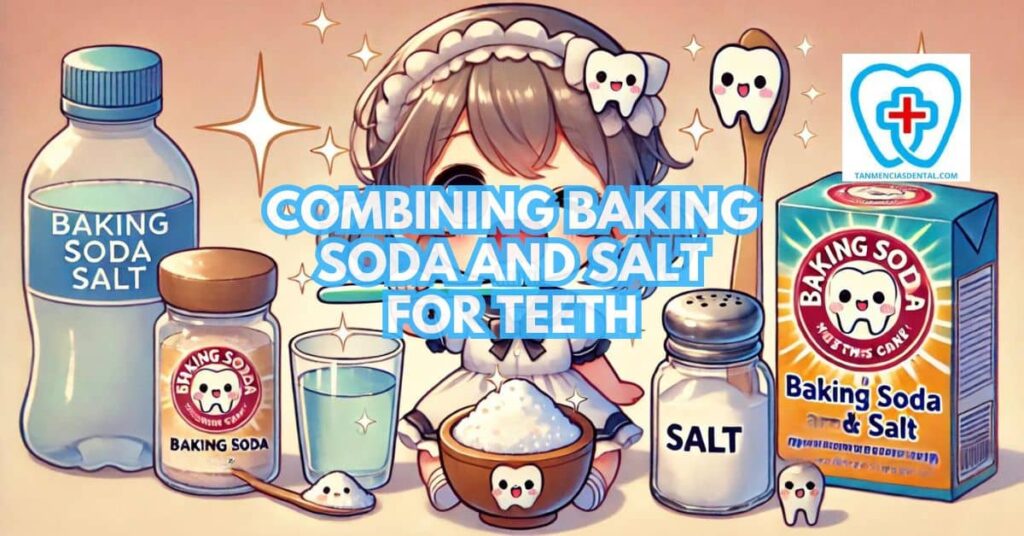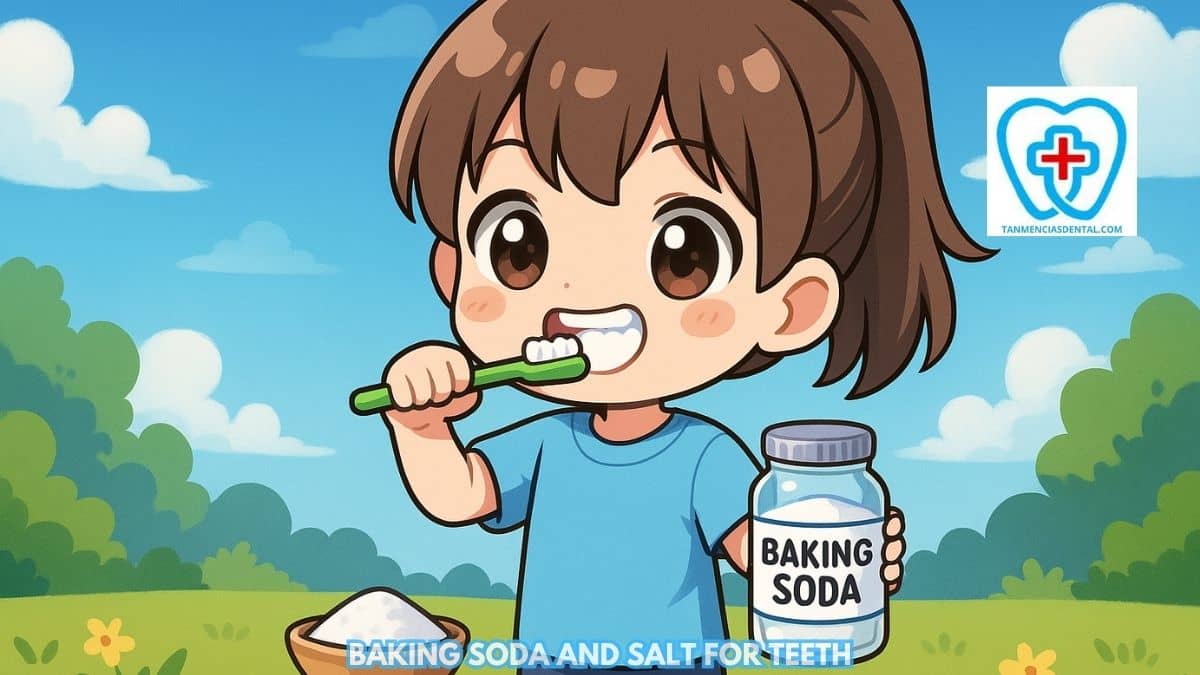Many people use baking soda and salt for teeth because these ingredients are easy to find and can help clean the mouth.
Some choose this simple mixture to avoid products that feel too strong or too complex.
While it can support oral health, it must be used the right way to avoid harming the teeth or gums.
Understanding how these ingredients work and when they may cause problems can help you make safer choices.
We’ll explain the benefits, risks, and best practices for using baking soda and salt for teeth.
1. Benefits of Using Baking Soda and Salt for Teeth
Baking soda and salt can be useful for people who want a simple way to care for their teeth at home.
Using teeth with baking soda can help remove plaque, which may lower the chance of tooth decay when used carefully.
Salt supports this process because it can slow the growth of harmful bacteria in the mouth.
These two ingredients may also help reduce bad breath and leave the mouth feeling cleaner.
Many people like this mixture because it is easy to find and gentle when used the right way.
It is still important to follow safe steps so the mixture does not harm the enamel or irritate the gums.
Learning how to use baking soda and salt properly helps you get the benefits while keeping your teeth healthy.
🦷 Understanding How Long A Dentist Appointment Takes
2. How Baking Soda Helps Whiten Your Teeth
Baking soda helps with tooth whitening because its tiny grains gently scrub away surface stains from the enamel.
The sodium bicarbonate in baking soda also reduces acidity in the mouth, which can help prevent new stains from forming.
Its mild abrasive action can make teeth look cleaner without the strong effect of many cosmetic whitening products.
When used correctly, it can remove stains from foods and drinks that tend to darken the teeth over time.
Many people notice small changes in brightness after regular but careful use.
However, baking soda should never replace fluoride toothpaste because it does not protect against cavities.
Using it too often can slowly wear down enamel and cause sensitivity.
It is best to use baking soda in moderation and ask a dentist for guidance if you plan to use it often.
🦷 How to Choose the Best Electric Toothbrushes for Receding Gums
3. The Role of Salt in Oral Hygiene
Salt has been used for centuries in oral care for its ability to fight bacteria and soothe the gums.
When used in small amounts, salt can help cleanse the mouth and reduce inflammation caused by minor gum irritations.
It also promotes salivation, which is important for keeping your mouth naturally clean by washing away food particles and bacteria.
In addition, saltwater rinses are often recommended after dental procedures to aid in healing and reduce infection risks.
While it won’t replace regular brushing and flossing, salt can complement your oral hygiene routine effectively.
🦷 Are Dentists Physicians? Unpacking the Professional Titles and Training
4. Mixing Baking Soda and Salt: The Right Ratio
Getting the correct ratio of baking soda and salt is essential for ensuring the mixture is effective yet gentle on your teeth.
Typically, a ratio of one part salt to two parts baking soda is recommended.
This combination ensures that the abrasiveness of baking soda is balanced by the antibacterial properties of salt, creating a mixture that cleans without being too harsh.
You can mix small batches in a clean container, using a spoon to blend them evenly.
Remember to avoid using too much salt, as it can increase the risk of gum irritation.
🦷 Can You Get Rid Of Gingivitis Permanently? Prevention Tips

5. How to Apply the Mixture Without Damaging Your Teeth
When applying the baking soda and salt mixture, it’s important to be gentle to prevent damage to your teeth and gums.
Use a soft-bristle toothbrush and apply the mixture in small, circular motions.
Avoid pressing too hard or scrubbing aggressively, as this can wear down enamel and cause gum sensitivity.
Brush for around two minutes, ensuring all surfaces are covered, but stop immediately if you feel any discomfort.
After brushing, rinse thoroughly with water to remove any residue and reduce the risk of irritation.
🦷 Can Dentists Do Braces? Why Knowing This Matters for Your Smile
6. How Often Should You Use Baking Soda and Salt?
While baking soda and salt can be beneficial, using them too frequently can be harmful to your teeth.
It’s generally advised to limit use to two or three times per week to avoid overexposing your enamel to abrasion.
Overuse can lead to enamel erosion, increased sensitivity, and even gum irritation.
On the days when you don’t use this mixture, continue with your regular fluoride toothpaste to ensure your teeth are protected.
Finding the right balance helps maintain the benefits without causing long-term damage.
🦷 Affordable Oral Surgery Options for Every Budget: Smile Without the Strain
7. Potential Risks of Baking Soda and Salt for Teeth
Although baking soda and salt offer advantages, they also come with certain risks, particularly when misused.
The abrasiveness of baking soda can wear down enamel over time, especially if applied too vigorously or too often.
Additionally, salt can irritate sensitive gums or exacerbate existing oral conditions like ulcers or gum disease.
Prolonged use of these substances without professional guidance can also result in tooth sensitivity or damage to dental work, such as fillings or crowns.
It’s essential to monitor how your teeth and gums react and adjust your use accordingly.
🦷 How Can Dentists Help Athletes? Maximizing Athletic Performance
8. Why You Should Not Combine This Mixture with Other DIY Teeth Cleaners
Mixing baking soda and salt with other home remedies, such as lemon juice, vinegar, or charcoal, can make the mixture much harsher on your teeth.
Acidic liquids, such as lemon juice and vinegar, can soften enamel, making your teeth more susceptible to damage when you brush.
Very rough substances like charcoal can increase the scratching on the surface of your teeth.
Using several strong methods at the same time raises the chance of sensitivity, irritation, and long-term enamel loss.
It is safer to use only one method at a time and to ask a dentist before trying anything new on your teeth.
🦷 Why Buying Packs Of Toothbrushes Can Save You Money and Improve Hygiene
9. Additional Oral Care Tips to Complement the Mixture
While baking soda and salt can be part of your oral care routine, they should not replace standard practices like brushing with fluoride toothpaste and flossing daily.
Drink water after meals to help wash away food particles and bacteria that can contribute to plaque buildup.
Consider using a mouthwash to further support gum health and freshen breath.
Furthermore, eating a balanced diet rich in calcium and vitamins supports strong teeth and healthy gums.
Following these tips will help ensure that your teeth remain clean and healthy alongside your baking soda and salt regimen.
🦷 Are Dentists Doctors? Understanding the Title and Training
10. When to Avoid Using Baking Soda and Salt on Your Teeth
There are times when using baking soda and salt is not a good choice for your teeth.
People with sensitive teeth, receding gums, or dental work may feel pain or irritation when using this mixture.
Those with sores in the mouth or gum disease can also see their symptoms become worse because the mixture can be too rough on the tissues.
Pregnant women or anyone with medical concerns should talk to a dentist who understands dentistry before starting this method.
A dental professional can help you decide if this mixture is safe for your specific needs.
If you notice any discomfort, stop using it and ask your dentist for advice.
🦷 Dental Diagnostics In Marikina
11. Why You Should Consult Your Dentist Before Trying This Mixture
Consulting your dentist before incorporating baking soda and salt into your dental care routine is crucial for protecting your oral health.
Your dentist can assess your teeth and gums to determine whether this method is suitable for you, considering factors like enamel strength and gum sensitivity.
They may also offer alternative solutions that are safer or more effective for your specific dental needs.
Regular dental visits allow for early detection of potential issues that could be aggravated by abrasive cleaning methods.
By seeking professional advice, you ensure that you’re using safe practices tailored to your oral health.
🦷 Tan-Mencias Dental Clinic: Complete Dental Care for Marikina Residents
👨⚕️ Conclusion
Combining baking soda and salt for teeth can offer benefits when done correctly, but it requires careful use and moderation.
Understanding the proper ratio, application methods, and risks is essential for protecting your teeth and gums.
Consulting with your dentist ensures that you’re making a safe choice for your oral health.
Balancing this natural method with regular dental hygiene practices, such as brushing and flossing, is the best way to maintain a healthy smile.
Ultimately, informed decisions lead to better long-term oral care and overall health.
❔ FAQs
1. Can baking soda and salt replace my regular toothpaste?
No, this mixture should not replace your regular fluoride toothpaste.
Fluoride toothpaste helps protect your teeth from cavities, which baking soda and salt cannot do.
It is safer to use the mixture only as a supplement to your normal routine.
2. Is it safe to use baking soda and salt every day?
Daily use is not recommended because it can wear down enamel and irritate your gums.
Most people should use it only two or three times per week.
This helps you get the benefits without harming your teeth.
3. Can this mixture whiten my teeth?
Baking soda can help remove surface stains, which can make your teeth look whiter over time.
The effect is usually mild and works best on stains from food or drinks.
It will not change the natural color of your teeth.
4. Who should avoid using baking soda and salt on their teeth?
People with sensitive teeth, receding gums, or dental work such as crowns or veneers should avoid this mixture.
It can also make oral sores or gum disease worse.
Anyone who feels pain or discomfort during use should stop right away.
5. Is it safe to mix baking soda and salt with other home remedies?
No, you should not combine this mixture with acidic or rough ingredients like lemon juice, vinegar, or charcoal.
These can soften or scratch your enamel and increase damage.
It is safer to use only one method at a time and ask a dentist if you are unsure.
😁 Self-Promotion
Visit Tan-Mencias Dental Clinic in Parang, Marikina City, for professional and friendly dental care.
Our team is here to help you with all your dental needs, ensuring your smile stays healthy and bright.
If you have any questions or concerns, feel free to reach out to us through our Facebook page, our website’s contact form, or by calling 0917-145-1074.
We’re always ready to assist you with a smile!
Come and experience compassionate care from our dedicated dental team.

